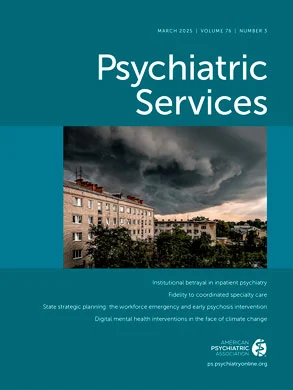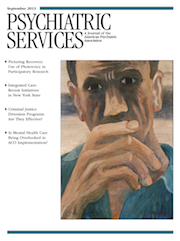To the Editor: For individuals with psychotic disorders, disengagement from treatment increases relapse risk (
1). However, research on the effectiveness of interventions for early psychosis in preventing disengagement has yielded inconsistent results (
2,
3).
This retrospective study examined the effectiveness of a multidisciplinary team intervention for patients with first-episode psychosis implemented in the Tokyo Metropolitan Matsuzawa Hospital in November 2009. A case manager allocated to each patient contacts the patient at least monthly and assists with social participation and clinical recovery by using psychosocial and pharmacological therapy according to guidelines (
4). To be eligible for the study, which was approved by the hospital’s ethics committee, patients had to be age 15 to 25, live in the catchment area, have an
ICD-10 F2 diagnosis (schizophrenia, schizotypal, and delusional disorders), and have first visited the clinic between November 2009 and October 2010 (intervention group) or between November 2007 and October 2009 (control group). Patients were not eligible if they had experienced multiple episodes of psychosis or had organic psychosis or a substance use disorder. For those who dropped out during the 12-month follow-up, outcome measurements at the last contact were used. We defined disengagement as dropping out during follow-up despite continued need and the team’s reengagement attempts. We defined functional remission as working or going to school for at least 16 per week for six continuous months. Outcomes were assessed by a blind rater (SA) using medical records. Analyses were conducted with Mann-Whitney U or Fisher exact tests in SPSS, version 17.0 J.
Of the 55 patients eligible for the intervention group, 40 were excluded (38 had multiple episodes and two had a substance use disorder). Of the 40 patients eligible for the control group, 25 were excluded (23 had multiple episodes and two had a substance use disorder). The 15 patients in the intervention group had a younger age at onset of psychosis and a longer duration of untreated psychosis than the 15 patients in the control group (p≤.01). However, the intervention group had a lower disengagement rate during follow-up (0% versus 33%, p=.04) and a lower rehospitalization rate (0% versus 20%, nonsignificant). Five patients in the intervention group were in functional remission at baseline, and all five sustained remission during follow-up. Of the six control group patients in functional remission at baseline, only one sustained remission (two disengaged).
The findings suggest that the intervention may be effective in preventing disengagement. The low disengagement rate in the intervention group may be attributable to the shorter follow-up period compared with previous studies (
2,
3) and to the relatively young age of the patients. In addition, all but one patient in the intervention group lived with family, which is characteristic of Japanese culture. We suggest that case managers play a vital role in preventing disengagement because they strengthen ties with users via continuous contact. The study had several limitations. In addition to the small sample, patients were not randomly assigned to the groups and no information on work history was available. We have undertaken a randomized controlled trial of this intervention (
5).
Acknowledgments and disclosures
This study was funded by grant H22-seishin-ippan-015 from the Ministry of Health, Labor, and Welfare. The authors thank Syudo Yamasaki, Ph.D., Naomi Inoue, Ph.D., Nozomu Asukai, M.D., Ph.D., Shigeko Ishikura, M.S.W., Etuko Aono, B.A., Hirohiko Harima, M.D., Toru Wakejima, M.D., and Yuji Okazaki, M.D., Ph.D.
The authors report no competing interests.

